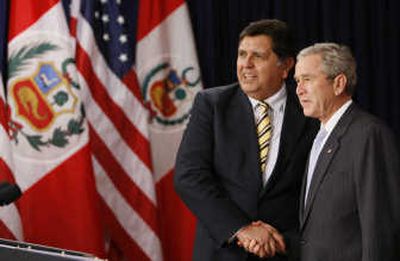Bush signs Peru trade pact

WASHINGTON – President Bush on Friday signed a U.S.-Peru free-trade agreement, paving the way for stronger economic ties and boosting the administration’s efforts to shore up relations with Latin America.
“The bill will help increase opportunities for workers, ranchers, farmers and business in both our countries,” Bush said, standing with Peru’s President Alan Garcia.
In calling on Congress to pass other free-trade agreements with Colombia and Panama, Bush – without naming names – criticized leftist leaders in Latin America.
“Across this hemisphere, people are watching what Congress will do … in regards to the free-trade agreements with Colombia and Panama,” Bush said. “The champions of false populism will use any failure to approve these trade agreements as evidence that America will never treat other democracies in the region as full partners. …
“It is vital that Congress send a strong message that the United States is committed to advancing freedom and prosperity in our neighborhood and approve these agreements with strong, bipartisan majorities.”
Bush said trade is a key driver of economic growth and helps lift people from poverty. He said Peru is one of the fastest-growing economies in the Western Hemisphere, expanding last year by more than 7.5 percent.
“Wish he’d lend us a couple of percent,” Bush joked.
The Senate approved the agreement, 77-18, on Dec. 4. That followed a 285-132 House vote last month. The agreement will go into effect after the two countries adjust laws needed to abide by it. Bush thanked Congress for passing the measure, and urged lawmakers to pass other pending free-trade agreements, including one with neighboring Colombia.
The bilateral trade deal approved by Congress is the first under a new Democratic formula that requires negotiators to put labor rights and environmental standards on par with tariff reductions, investor protections and other key elements of the accord.